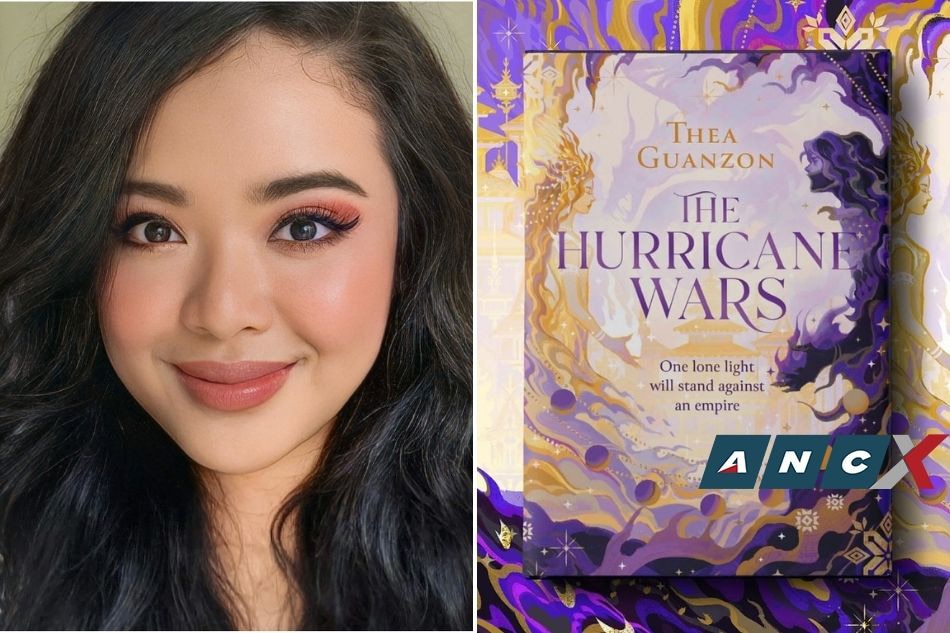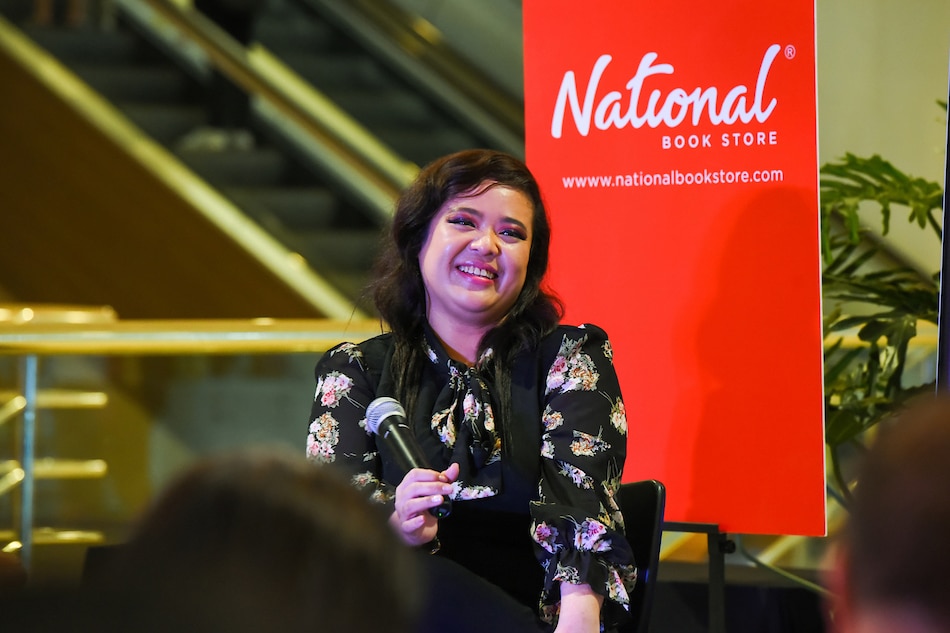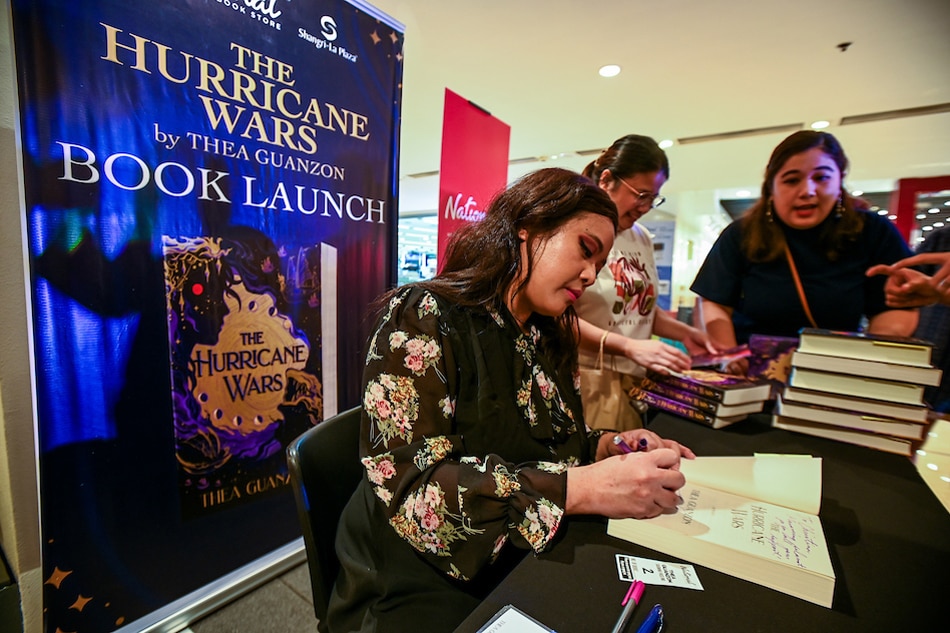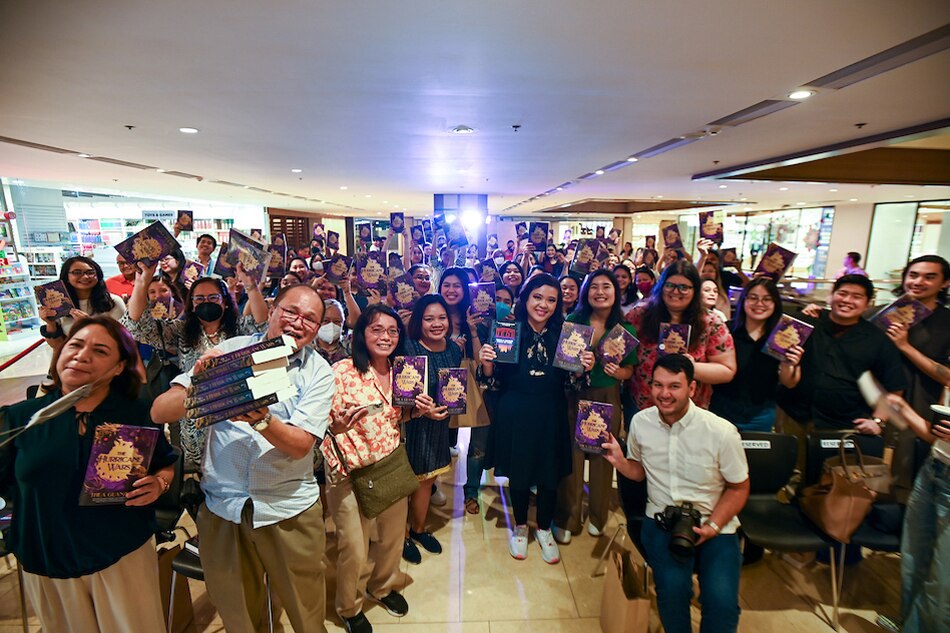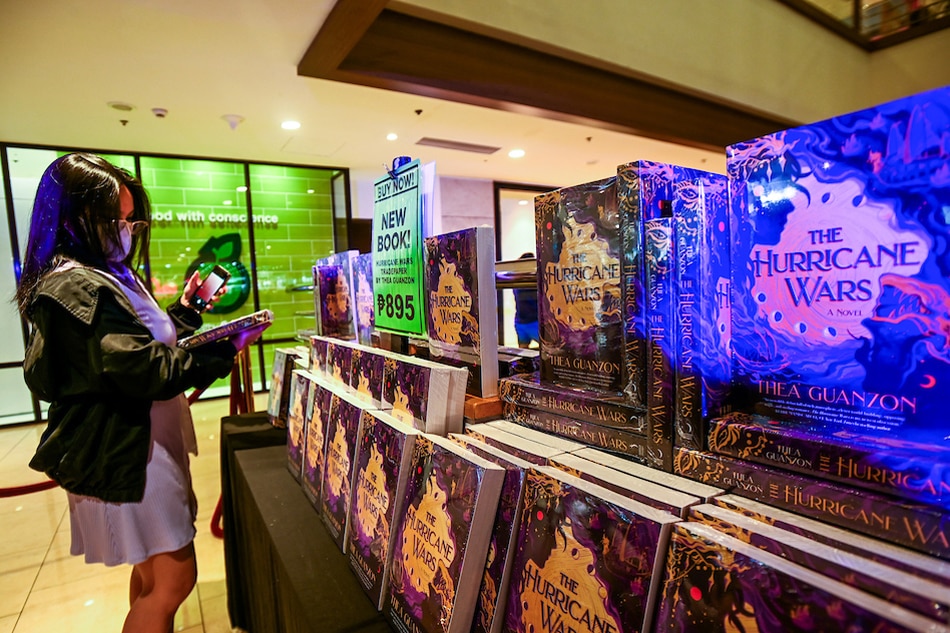“It’s been a wild ride,” 34-year-old Pinay author Thea Guanzon tells ANCX, reflecting on the success of her debut romance fantasy novel “The Hurricane Wars.”
Since its release last October 3 in the US, the novel, published by Harper Voyager, a subsidiary of HarperCollins, has already made it to New York Times Bestsellers list and Barnes and Noble’s Best Books of 2023.
Guanzon, who hails from Bacolod, says she has always considered writing as a favorite pastime but never deemed it a practical career choice. “Living in the Philippines, it’s very hard to make a living out of the arts. So I just considered it as a hobby for the longest time, posting my short stories online,” she shares.
She decided to pursue International Studies at Miriam College with the goal of becoming a Foreign Service officer. Her initial career plan was to pursue a Master’s degree first and subsequently take the Foreign Service exam. But her path took an unexpected turn when an editor from one of the major publishing houses in the United States contacted her. “She asked me if I'd ever thought about writing an original novel because she had been following my short stories online,” she recalls.
Encouraged by this, Guanzon decided to take the plunge. Consequently, an agent contacted her, offering representation, and from there, her journey gained momentum, evolving into an exhilarating adventure.
“The Hurricane Wars” is about Talasyn, a secret wielder of forbidden light magic, and Prince Alaric, an heir to the ruthless Night Empire, who discover their destinies entwined. “Talasyn and Alaric both know this war can only end with them,” reads the book synopsis. “But a greater threat is coming, and the strange new magic they can create together could be the only way to overcome it. Thrust into an uneasy alliance, they will confront the secrets at the heart of the war and find, in each other, a searing passion—one that could save their world… or destroy it.”
ANCX had the opportunity to talk to the Ilongga author about her journey as a writer, her creative process, and the messages she hopes readers to glean from her novel.
How did you discover your passion for storytelling?
When I was very young, my grandfather kept a vast library at his ancestral house and we would visit every weekend. That was one my earliest memories, just reading all those old books and feeling the very fragile paper in my hand and smelling the scent of dusty, old books. Ever since I was a child, I always really loved to read stories and to get lost in other worlds and I guess somewhere along the way, it just inspired me to try to create worlds of my own. I also really like playing around with language. I really love how it can be manipulated and be played with in order to express a feeling.
What books inspired your literary journey?
There’s a lot but usually when I'm asked who my most formative inspiration is, it's probably Neil Gaiman. I first read his books when I was in grade school and it was so interesting to me because he was my introduction to a new kind of fantasy, fantasy that was written in more contemporary language. I was really blown away by his imagination and I really like the poetic quality of his prose so I aspired to be like him.
After Neil Gaiman, I also read Gregory Maguire, whose descriptions are very lyrical and immersive and atmospheric. And then there's Amy Tan, who also has a really good ear for prose, for very delicate and vivid language. In trying to be like all of these writers, that was when I stumbled upon my own voice in a sense because I was writing every day at that point. After a lot of practice and after reading all these great works, it was a combination of all of that, that put me on this path that I am on now.
What are your other interests and hobbies?
Well, when I'm not writing, I like to travel. I like to play Dungeons and Dragons. It was actually so funny how that started. All my friends were all so interested in playing Dungeons and Dragons, but no one wanted to be the Dungeon Master. So I was like, okay, try ko na lang. I bought the player's handbook and I tried to learn all the rules. And then I’ve been DM’ing for our group ever since. I have been a player once or twice. But I'm always a DM. I think it's also been good practice for writing. It helped me set the scene, [it taught me] how to improvise.
So being a dungeon master helped you visualize your novels?
Yes. (Laughs.) Because the thing with being a DM is it has to be a balance between setting the world in such a way that your player-characters become invested in it, and also keeping the story moving, so that no one gets to get too bored. So I think that was really good practice for writing especially with fantasy where there’s always a fine line between world building and too much information.
Do you have any writing rituals or quirks when you're working on a novel?
Every day I ate shawarma rice for dinner. It’s my brain food. (Laughs.) So I would write several chapters in one day and then I order from Ababu [Persian Kitchen] in Katipunan. Another thing that I need while I'm writing is I always have to be drinking iced coffee.
If you could spend a day with one of your fictional characters, who would that be and what would you do together?
I think I would really like to spend a day with maybe Talasyn, the main character in 'The Hurricane Wars,' because she's so funny. I think that I would have fun hanging out with her because she has a very snarky sense of humor and she's very down to earth. She would be more approachable than Alaric definitely.
What memorable experiences left a lasting impact to your writing?
I travel a lot. And it's always when I see all these beautiful landscapes all over the Philippines and all over the world. I think that every bit of it has left an impact on me in a sense that it has inspired me to try to capture the beauty of this world as much as I can using my gift with words. And I think that's what being a writer is like, portraying the world as you see it in your own way.
Are there any particular real-world events that shaped your perspective in writing the book?
Of course. The weapons of mass destruction in this book are based on storm magic, which was definitely inspired by living here in the Philippines. A lot of typhoons come through here every year and it's always an ongoing nationwide conversation how best to mitigate their effects. I took inspiration from that in writing stories about people who are working together to help one another in the aftermath of storms. I also drew from our own nation's history, how we have fought against oppression for so many years and how our the birth of our nation is rooted in a story of violent conflict. So when I was writing about all these people who would do anything to save their motherland to preserve their idea of a nation, I was definitely inspired by the stories of our heroes, stories of our ancestors.
What do you find the most rewarding about sharing your stories to the world?
When I started writing 'The Hurricane Wars,' I had not really given much thought to how important it was as a piece of representation because we live in the Philippines and consume local media. We are surrounded by people who look like us. But when 'The Hurricane Wars' started trickling out into the world in the form of advanced copies, I started receiving so many messages from the Philippine diaspora, especially in the United States. They were people who have read the book and they really loved seeing the Filipino representation. It was just so great because it helped me understand why we need more diversity in literature — people deserve to see themselves on the pages [of books]. All these first generation Filipino-Americans they were messaging me, ‘Oh my God, you wrote about taho, about the tarsiers.’
So I think that was a very rewarding experience because I was helping these people feel represented in media. Then there were also Filipino immigrants who hadn't been back to the country in quite a while. And it was so sad because some of them were apologizing to me that they forgot how to speak Tagalog. And then, they were talking about how much they missed home and how much reading the book made them feel like they were home just even just for a while. It was also really great to be able to put forward a piece of the Philippines and into the wider world. I think that has been a really good part of being an internationally published writer.
What inspired you to write 'Hurricane Wars?' Is there a particular message that you hope the readers would take away from it?
I really liked the enemy to lovers trope. So this is me sharing my own take on that with the world. As for what I hope readers will take away from it, I hope that it will encourage them to learn more about Southeast Asia and seek out more of our stories because my book barely scratches the surface; there's so much more out there. Southeast Asia is such a beautiful, diverse and colorful region and we have so many interesting tales to share with the rest of the world. I also hope that even just one Southeast Asian reader out there will read this book and be inspired to write a story of their own because we need more Southeast Asian voices in the picture.
What are the most challenging aspects of writing 'The Hurricane Wars' and how did you overcome those?
I think maybe one of the most challenging things was I did not know a lot about Filipino traditions when I first started. So I had to do a lot of research on that. I was researching architectural styles, fashion etc. There was so much I did not know about the Philippines. I did not even know that there were still some native architectural styles that are still alive and kicking up to this day, stuff like that. But I think that is why I really enjoyed writing this book as well because it brought me closer to my Filipino heritage. You wouldn't think that someone who has lived here all her life would not know so many things about her own country. It was a wake-up call for me in a sense.
If you could offer a piece of advice to your younger self, what would that be?
I would I would tell her to not bother with pre-med or pre-law and just pursue her passion right from the start. I would tell her that you would be so much happier if you just follow your dreams instead of trying to conform to everyone else's expectations. It would save so much time and heartache. (Laughs.)
Can you give us a glimpse into your future projects?
Yes, I'm working on Book Two of The Hurricane Wars Trilogy right now. Aside from that, I am planning on writing a contemporary urban fantasy set in modern day Philippines. But let's finish book two first.
What advice would you give aspiring Filipino writers looking to embark on their own creative journey?
Aspiring Filipino writers might find themselves boxed in or automatically categorized by the international publishing industry. They will expect you to act a certain way and write a certain way because you are Filipino. So I want to encourage everyone to just write what they want and don't worry about having to cater to the stereotypes. Also, it's really, really important that you find an agent or an editor or a small press who really has your best interests at heart. Don't be afraid to ask questions and if an offer is giving you sketchy vibes, don’t be afraid to walk away from it.


